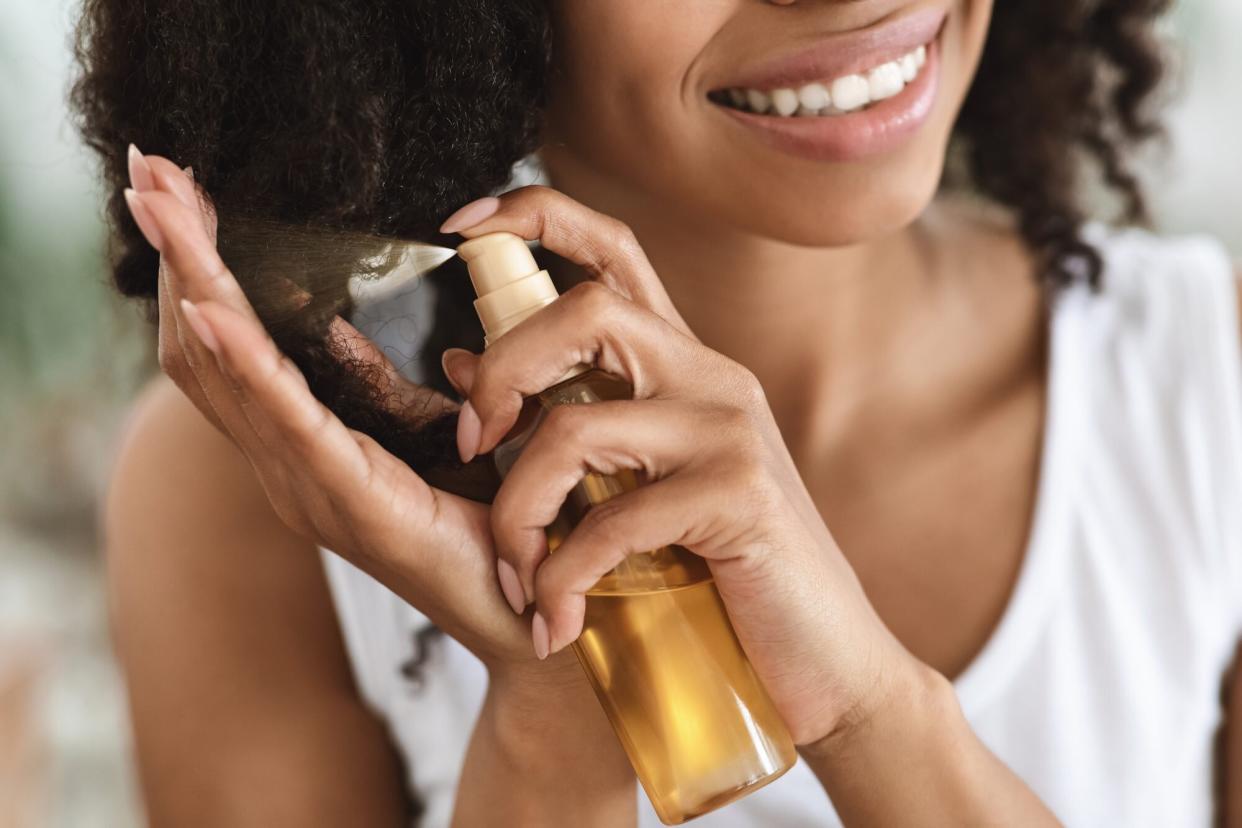How Essential and Carrier Oils Benefit Your Hair, According to an Expert

Getty / Prostock-Studio
One of the best things about taking care of your hair is knowing that the everyday products you use are doing the work to keep it healthy. As for two more beneficial products you should add into your haircare regimen? Essential and carrier oils. "Essential oils are concentrated oils; carrier oils are natural oils typically made from the fatty parts of plants and seeds," explains McKenzie Lehmann of CHI Haircare. To reap their benefits, use them together—add a couple drops of essential oils into a carrier oil and evenly apply them to your scalp and hair. The end result will leave hair nourished, shiny, and moisturized—so long as you choose the correct combination for your texture. Ahead, our expert shares more about these hair oils and the most popular types to add into your beauty routine.
Related: What's the Best Oil for Your Specific Skin Type?
Essential Oils
Essential oils are most commonly used to treat the scalp. One of the most popular iterations is peppermint oil, which is known to increase circulation and promote better hair growth, Lehmann says. For a cleaner scalp, she recommends lavender oil; it contains antimicrobial properties to help prevent fungi. And if someone is experiencing scalp irritation, tea tree oil—which is found in the CHI Tea Tree Serum ($17.13, amazon.com)—is known to provide soothing relief (it's a natural antioxidant). If you haven't created your own essential and carrier oil mixture before, don't fret: It's simple. You just add the former into the latter in the correct parts. Lehmann does, however, recommend consulting with your stylist first: "Essential oils can be very aggressive if not diluted properly, and I think it's best left to the professionals to recommend a product with the appropriate blend for your hair type," she says.
When seeking out products packed with essential oils, Lehmann always chooses formulations with a silk base; these nourish curly hair types in particular. "Without a doubt, if you have any sort of curl pattern to your hair, you need some sort of nourishment," she shares. "Even though our scalp produces great oils for healthy hair, with each curve and turn of the hair strand, its oils dissipate more and oftentimes leaves the ends dry and brittle." She adds that silk has 17 of the 19 amino acids found in the strands of our hair—"so, in simple terms, silk oil is basically a liquid repairing band-aid." Her favorite silk-based product is the CHI Aloe Vera Oil ($25, ulta.com), which is designed to repair and rejuvenate the cuticle.
Carrier Oils
While carrier oils are known generally to seal in moisture and leave hair soft and healthy, many actually boast other benefits. Take jojoba oil, for example. "Since jojoba is a wax, it is able to seal your hair with a protective layer to keep it from losing moisture," Lehmann says. "This is going to help retain the moisture in the hair strand and help the hair from frizzing—plus, give the hair a fuller look!" She adds that jojoba oil is also similar to the sebum that your skin produces, which means it is less likely to cause build-up on the scalp.
Argan oil is known for its fatty acid content; it also provides a generous amount of vitamin E that seeps deeply into hair. And since it's not a heavy oil, it can repair hair without weighing it down, which makes it great for those with finer strands. Keep in mind, however, that it can add a tint to lighter hair. "Argan oil many times has a rich amber tone to it, and with cheap ingredients it can be known to stain a light color hair strand!" Lehmann says. For a safe alternative, she recommends blending argan oil with moringa oil for better absorption. Together, they add strength to hair without staining on the cuticle—and both appear in CHI's Argan Oil ($15.10, amazon.com). For those seeking a heavy oil to smooth and greatly reduce frizz, she recommends olive oil; for anyone wanting a universal option, coconut oil leaves hair feeling moisturized and soft.

